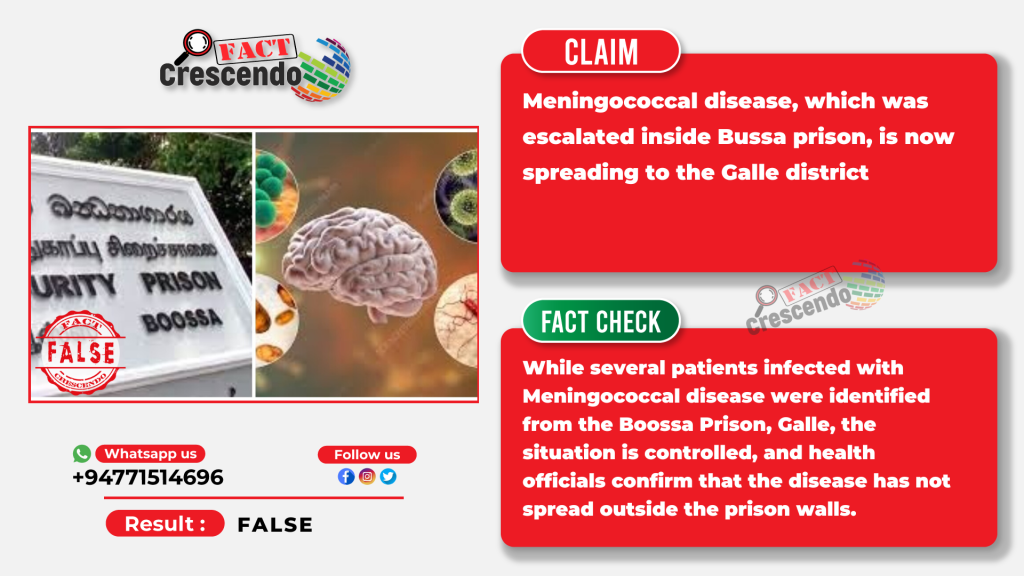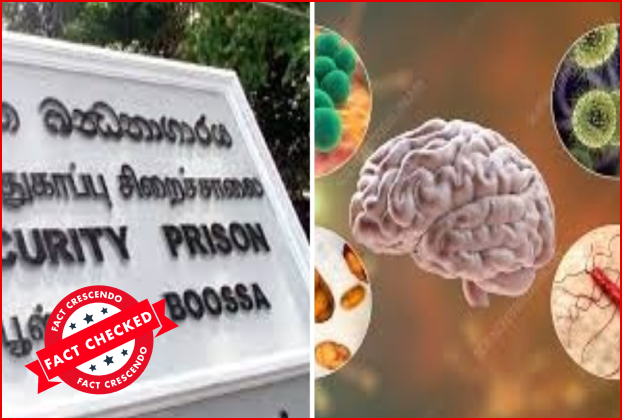
දිනපතා සත්ය කරුණු දැන ගැනීමට අපගේ WhatsApp සමුහයටමෙතනින් එකතුවන්න.
Two inmates from Boossa prison in Galle, Sri Lanka, recently succumbed to Meningococcal disease, a contagious illness. Subsequently, prison authorities promptly implemented measures to contain the spread of the disease. Amidst these events, some misleading claims have arisen regarding the nature and extent of the disease’s transmission. This investigation aims to address and clarify these assertions.
Social Media Posts.
A viral message on WhatsApp claimed that a meningitis outbreak originating from the Boossa Prison in Galle had extended beyond the prison walls and that there would be an increase in fatalities due to this illness in the coming weeks, requesting the public to be vigilant.

We noticed this claim to be shared on Facebook too.

Fact Check
We separated the content of social media posts into separate claims for the convenience of fact-checking.
Claim 1: Spread of Meningitis in Galle Originating from the Prison
Verdict: Partially True
Two inmates from the Boossa prison in Galle had passed away due to Meningococcal disease caused by Neisseria meningitidis. Meningococcal disease is contagious and can lead to meningitis—an infection of the brain and spinal cord—and blood infections.
Also, Dr G. Wijersuriya, the Deputy Director General of Health Services, states that there are some speculations about whether a youth who was earlier released from prison and later admitted to Karapitiya Hospital was the primary source of the disease. More details about the situation in the Boossa prison can be read here.
Furthermore, Health officials say there is no need to create unnecessary fear about the disease spreading in Galle prison, as this disease has also been reported in isolation in previous years; the situation is now contained, and no patients have been reported among the public in Galle area.
Claim 2: Spread of Meningitis to People Outside the Prison
Verdict: Not Substantiated & Under Investigation
Officials from the district health service have held a press conference stating that the situation is under control and no cases of Meningococcal disease have been reported from outside the prison.
Additionally, a spokesperson of the Health Promotion Bureau of Sri Lanka has denied the rumours of an epidemic and asserted that the situation is under control and has not extended outside the prison. Prison spokesman Chandana Ekanayake also assured the same.
This was corroborated by a media representative from Galle, Ravindra Liyanage, who confirmed that there have been no reported cases beyond the prison walls.
However, after the death of an 8-month-old girl in Karapitiya Teaching Hospital, Galle, on 26th August, there has been some speculation as to whether it was linked to meningococcal disease and if the disease had spread outside the prison walls. Health officials are conducting further investigations to assess the situation. More on this here
Furthermore, another patient with meningococcal disease from Colombo. However, Dr J. Wijesuriya, Deputy Directory General at the Ministry of Health in Sri Lanka, confirms that both incidents are unrelated and that there is no reason to panic, as seen here.
Claim 3: Fatal and Rapid Course of the Disease
Verdict: Misleading
While it is true that some forms of meningitis can be severe and require immediate medical attention, the claim that the disease is fatal within hours is an exaggeration. Meningococcal disease does require prompt medical intervention, but not all cases result in death, especially when treated promptly.
More details about Meningitis can be learnt from this video by Dr Thushara Priyawansha and from this article
Claim 4: Permanently Disabilities Among Survivors
Verdict: Partially True
If not treated promptly, meningitis can lead to severe complications, including permanent disabilities such as hearing loss, cognitive impairments, and neurological issues. However, the claim that all survivors will have permanent disabilities is overgeneralised. The severity of complications can vary widely among individuals and is influenced by factors such as the type of bacteria involved, the speed of diagnosis, and the effectiveness of treatment. More details can be read here.
Vaccines can help prevent meningococcal disease, an illness caused by Neisseria meningitidis bacteria. More on this here
More information about meningococcal disease can be reached via this explanation provided by the Health Promotions Bureau of Sri Lanka.
Follow us and stay up to date with our latest fact checks.
Facebook | Twitter |Instagram | Google News | TikTok
Conclusion
In conclusion, while there was an incident of Meningococcal disease within the Boossa prison in Galle, Sri Lanka, the claim of a widespread outbreak extending beyond the prison is not substantiated by available credible sources.
District health officials, media representatives, and the Health Promotion Bureau have all stated that the situation is under control and that there is no evidence of an epidemic outside the prison. As with any health-related information, relying on official statements from verified sources is essential to ensure accurate and reliable information dissemination.

Title:Meningococcal disease has not spread virally in Galle, Sri Lanka!!
Written By: Kalana KrishanthaResult: False






